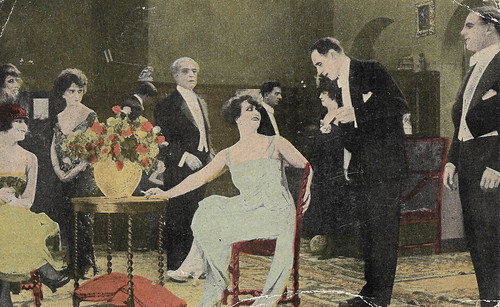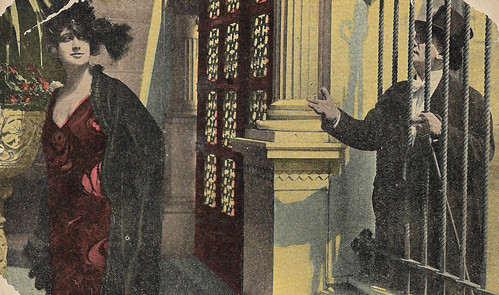
Spanish cromo by Chocolat Imperiale, Barcelona, no. 1 of 6. Photo: Distr. J. Verdaguer, Barcelona / Fert. Italia Almirante in L'innamorata (Gennaro Righelli, 1920).

Spanish cromo by Chocolat Imperiale, Barcelona, no. 2 of 6. Photo: Distr. J. Verdaguer, Barcelona / Fert. Italia Almirante and Alberto Collo in L'innamorata (Gennaro Righelli, 1920).
A tragedy caused by frivolity
in L'innamorata/The Woman in Love (Gennaro Righelli, 1920), vampish Mara Flores (Italia Almirante) leads the life of a capricious and elegant society lady. Her life is one string of adventures, while her ex-tutor and counselor Prince Benedict keeps an eye on her patrimony.
Her newest conquest is the electric engineer Carlo Valdieri (Alberto Collo) who thinks her house is a branch office of paradise, but with vague excuses, he is closed out of this heaven. The next day she visits the Central power plant, where she hears he is busy and her beauty doesn't suffice to reach her goals.
She meets Luigi Arnaldi (Annibale Betrone), who is both his brother and the factory director, and tries to seduce him but doesn't manage, as he focuses on his work and his family. (In Italian sources Luigi is called Franco.) The friendship between Mara and Carlo works so intoxicatingly on him that he is forced to sign letters of credit above his own budget. Out of caprice, she visits Luigi, who explains to her that touching one of the electricity cables is deadly, he also tells her Carlo cannot pay his debts. Mara then decides to distance herself from Carlo and renews her friendship with the Prince, her tutor.
This troubles the brains of Carlo such that he announces Mara to kill himself. Feeling her beauty is the cause of this, Mara runs to him but still arrives too late. Before this tragedy, the woman understands the harm her frivolity has caused. Mara is inconsolable, she cannot smile anymore and her eyes are filled with tears. Her only comfort is her love for Luigi Arnaldi, but he cannot forget what happened and refuses to receive her. She insists, declaring her love with passion. Finally, Luigi gives in.
Yet, happiness is disturbed again, as Mara is haunted by gossip and slander, and Luigi neglects his work. The chairman of the factory board sends Luigi's mother a letter about the conduct of her son. Luigi's sister Orietta (Orietta Claudi) accuses Mara of destroying Luigi like she did Carlo. Mara tries to mend with the two women but is rejected bitterly. The next day she accompanies Luigi to the factory, explains what happened, and accepts her loss. When he doesn't look for a moment she lies down as on an altar while the deadly current immolates her life for the sake of the man she loved so much.

Spanish cromo by Chocolat Imperiale, Barcelona, no. 3 of 6. Photo: Distr. J. Verdaguer, Barcelona / Fert. Italia Almirante and Alberto Collo in L'innamorata (Gennaro Righelli, 1920).

Spanish cromo by Chocolat Imperiale, Barcelona, no. 4 of 6. Photo: Distr. J. Verdaguer, Barcelona / Fert. Italia Almirante and Annibale Betrone in L'innamorata (Gennaro Righelli, 1920).
In this film, she reveals the rich resources of her artistic temperament
L'innamorata/The Woman in Love (Gennaro Righelli, 1920) was based on the well-known novel 'L'orizzontale' by Augusto Genina, which title already hints at the past of this woman and was also the first of a long list of changes imposed by the Italian censor.
The title became L'innamorata and the subtitle of the film was Mara Flores. In the UK the film was released as Payment in Full and in Spain as Eva pecadora.
The film, with sets by Giulio Lombardazzi and cinematography by Ubaldo Arata, had its Roman premiere on 9 April 1920.
In 1921, the critic of the Neapolitan film journal La Cine-fono, Carlo Fischer, raved about the script (even if admitting the plot was simple), the cinematography, the beautiful exteriors, and, above all, the performance of Manzini:
"Italia Almirante Manzini is not unknown in the film world - actually, the opposite - but never she gave such an important performance as in Mara Flores. From this brilliant performance, we are convinced that this sympathetic actress will triumph on the screen. In this film, she reveals the rich resources of her artistic temperament, with sobriety, a nonchalance, an enchanting charm."
In 1994, a 40-minute restored version of L'innamorata/The Woman in Love (Gennaro Righelli, 1920) was presented by the Cineteca di Bologna at the Il cinema ritrovato film festival.

Spanish cromo by Chocolat Imperiale, Barcelona, no. 5 of 6. Photo: Distr. J. Verdaguer, Barcelona / Fert. Italia Almirante and Annibale Betrone in L'innamorata (Gennaro Righelli, 1920).

Spanish cromo by Chocolat Imperiale, Barcelona, no. 6 of 6. Photo: Distr. J. Verdaguer, Barcelona / Fert. Italia Almirante and Annibale Betrone in L'innamorata (Gennaro Righelli, 1920).
Sources: Vittorio Martinelli (Il cinema muto italiano. I film del dopoguerra, Vol. 1920), IMDb, Wikipedia (Italian) and the content of the plot was taken from the back of the cards.
No comments:
Post a Comment